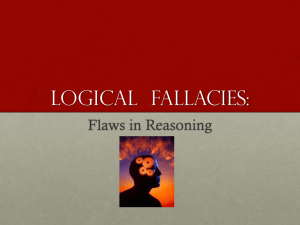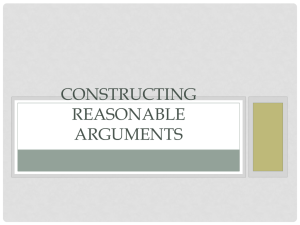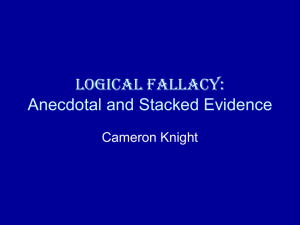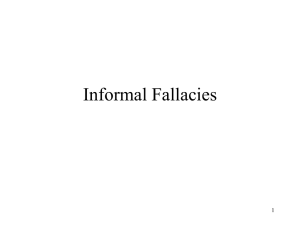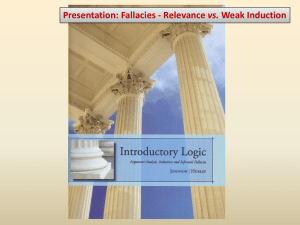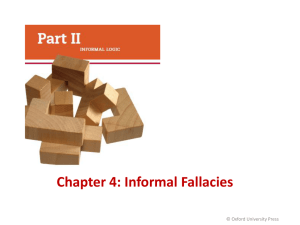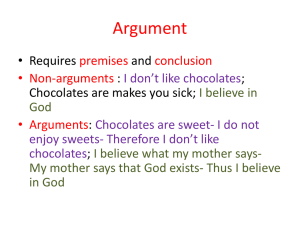Document
advertisement
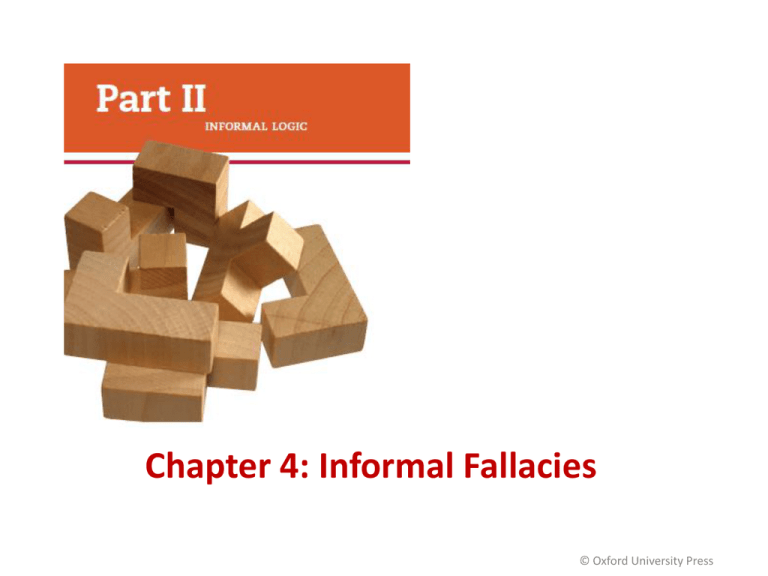
Chapter 4: Informal Fallacies © Oxford University Press In This Chapter A. B. C. D. Fallacies of Relevance Fallacies of Unwarranted Assumption Fallacies of Ambiguity or Diversion Recognizing Fallacies in Ordinary Language © Oxford University Press Fallacies Fallacy: A defect in an argument that consists in something more than merely false premises. Both deductive and inductive arguments may contain fallacies, and, if they do, they are either unsound or uncogent, depending on the kind of argument. Also, if an argument is either unsound or uncogent, then it has one or more false premises or contains a fallacy or both. Two kinds of fallacies: formal fallacies and informal fallacies © Oxford University Press Informal Fallacies • Formal fallacy: A logical error in a deductive argument that occurs in the form or structure of an argument. All beagles are dogs. All poodles are dogs. All B are D. All P are D. All beagles are poodles. All B are P. Any substitutions of this exact form will also be INVALID • Informal fallacy: A mistake in reasoning that occurs in ordinary language, including mistakes due to relevance, unwarranted assumption, and ambiguity or diversion. © Oxford University Press • Informal fallacies cannot be detected by form, but require an analysis of content, regardless of whether the argument is inductive or deductive. Consider: All factories are plants All plants have chlorophyll All factories have chlorophyll This appears to have the form: All A are B All B are C All A are C Which is clearly valid. © Oxford University Press But, given that the word “plant” is used in two different ways, the form is actually: All A are B All C are D All A are D Notice, then, the argument contains an informal and a formal fallacy. © Oxford University Press Fallacies of Relevance Fallacies that occur whenever irrelevant premises are offered in support of a conclusion. Irrelevant premises often rely on psychological or emotional appeal for their persuasive force. 1. Argument Against the Person 2. Tu Quoque 3. Appeal to the People 4. Appeal to Pity 5. Appeal to Force 6. Appeal to Ignorance 7. Missing the Point 8. Appeal to an Unqualified Authority © Oxford University Press Argument Against the Person Argumentum ad Hominem — “to the person” When a claim is rejected based on alleged character flaws, negative stereotype, or life circumstances of the person making the claim. Senator Hilltop thinks my administration’s tax proposals are bad for the country. His political party lost the last election. Members of the losing party are always jealous of the winning party. The premises attack Senator Hilltop's party affiliation and negatively stereotype the senator and his party. © Oxford University Press Tu Quoque Tu Quoque —“you, too” A type of ad hominem fallacy distinguished by the attempt of one person to avoid the issue at hand by claiming the other person is a hypocrite. You have been lecturing me about not joining a gang. But Dad, you were a gang member, and you never went to jail. So, I'll make my own decision about joining a gang. This tu quoque attack is aimed at the dad, not at dad's arguments. The premises are used to imply that “Dad, you are a hypocrite,” which is then used to reject Dad’s arguments: I can disregard your lectures. © Oxford University Press Appeal to the People Argumentum ad Populum The avoidance of objective evidence in favor of an emotional response, defeating a rational investigation of truth. Public schoolteachers are demanding a pay raise and are threatening to strike. A prolonged strike will jeopardize our children’s future and result in an unbalanced budget, leading to raised taxes. So are you for or against a pay raise for public school teachers? Terms like demanding, threatening, prolonged strike, and jeopardize evoke a sense of dire consequences and provoke anger in taxpayers and voters. . © Oxford University Press Appeal to Pity Argumentum ad Misericordiam — “from pity or guilt” An emotional plea that relies solely on a sense of pity for support. Your honor, before you sentence my client for the murder of his parents, I ask you to consider his situation. He is an orphan. Perhaps you can give him the lightest punishment possible. The premises simply ask the judge to pity the defendant because he is a self-caused orphan. © Oxford University Press Appeal to Force Argumentum ad Baculum — “appeal to the stick” A threat of harmful consequences (physical and otherwise) used to force acceptance of a course of action that would otherwise be unacceptable. If the workers of this company do not agree to a 25% cut in salary, then the company may have to shut its doors. Therefore, the workers of this company must agree to a 25% cut in salary. The premise is an obvious threat without providing objective evidence for the conclusion. . © Oxford University Press Appeal to Ignorance Argumentum ad Ignorantiam — “arguing from ignorance” An argument built on a position of ignorance claiming either: 1. 2. a statement must be true because it has not been proven to be false or a statement must be false because it has not been proven to be true. There is no life anywhere else in the universe. We have never received signals from any part of space. The conclusion is based on the lack of signals from outer space, while our failure to detect signals may signify our ignorance of better methods for detecting life. © Oxford University Press Missing the Point Ignoratio Elenchi — “irrelevant proof” When premises that seem to lead logically to one conclusion are used instead to support an unexpected conclusion. If we buy a second car, the insurance will only be an additional $400 a year. Let’s go get one before the insurance company changes the rate. The gap between the premises and conclusion is so great that the conclusion becomes, in a sense, irrelevant. © Oxford University Press Appeal to Unqualified Authority Argumentum ad Verecundiam — “appeal to reverence or respect” Relies on the opinions of people who have no expertise, training, or knowledge relevant to the issue at hand. I'm Nick Panning, quarterback of the Los Angeles Seals. I've been eating Oaties for breakfast since I was a kid. Oaties provides nutrition and vitamins and helps build strong bones. Oaties tastes great. You should get some for your kids today. Merely being famous does not qualify someone to pronounce the merits of a product. © Oxford University Press

